

SUBSCRIBE TO OUR FREE NEWSLETTER
Daily news & progressive opinion—funded by the people, not the corporations—delivered straight to your inbox.
5
#000000
#FFFFFF
To donate by check, phone, or other method, see our More Ways to Give page.


Daily news & progressive opinion—funded by the people, not the corporations—delivered straight to your inbox.
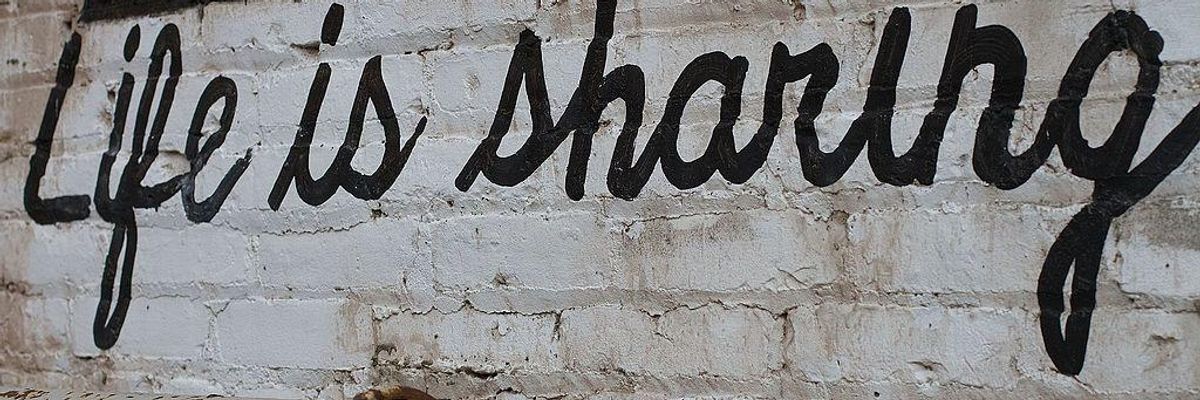
We can transform capitalism by encouraging the 'better angels of our nature.' (Photo: Flickr/Cogdogblog. CC BY 2.0.)
The solidarity economy is a global movement to build a post-capitalist world that puts people and planet front and center, rather than the pursuit of blind growth and profit maximization. It isn't a blueprint but a framework that includes a broad range of economic practices that align with its values: solidarity, participatory democracy, equity in every dimension including race, class and gender, sustainability and pluralism, which means that it can't be a one-size-fits all approach. Nevertheless, the notion of buen vivir, or living well and in harmony with nature and each other permeates everything the movement does.
Some of these practices are old and some are new; some are mainstream and others are 'alternative.' Solidarity economy practices exist in every sector of the economy: production, distribution and exchange, consumption, finance and governance/state. People often think about cooperatives and credit unions which are collectively owned and managed by their members, but they are just one example. Others include community land trusts, participatory budgeting, social currencies, time banks, peer lending, barter systems, gift exchange, community gardens, ideas around 'the commons,' some kinds of fair trade and the sharing economy, and non-monetized care work.
The idea of the solidarity economy is to build on and knit together all of these practices in order to transform capitalism by lifting up and encouraging the 'better angels of our nature.'
The idea of the solidarity economy is to build on and knit together all of these practices in order to transform capitalism by lifting up and encouraging the 'better angels of our nature.' Rather than making a virtue out of the pursuit of calculated self-interest, profit maximization, and competition--the things that underpin capitalism--this economy nurtures our capacity for solidarity, cooperation, reciprocity, mutual aid, altruism, caring, sharing, compassion and love. Increasingly, research across many disciplines has shown that we are hard wired to cooperate--that in fact, the survival of the human species has depended on our ability to work together.
If this sounds like something you want to support, here are seven ways to help build the solidarity economy.
1. Increase self-provisioning and community production.
Throughout history communities have grown and foraged for food; built roads, irrigation systems and housing; developed medicines and made clothing, furniture and art in order to sustain themselves. But under capitalism we are incentivized to buy all this stuff and so need jobs to earn money in order to pay for it. Since the 2008 global economic meltdown there have been increasing fears about the instability and fragility of this kind of economy. Add to this the projection that 40 per cent of jobs in the US could be replaced by Artificial Intelligence and automation and it becomes even more urgent to think about how communities can provide more for themselves in order to survive impending economic collapse or massive job destruction.
Community production includes low-tech ways of meeting needs like growing food and raising chickens in community gardens and 'edible' urban landscapes, as well as swap-meets, mutual aid networks and skill-shares. But it also extends to democratizing cutting-edge technologies. In Detroit, for example, (where some communities have been living with massive joblessness for decades), the James and Grace Lee Boggs Center to Nurture Community Leadership and Incite/Focus, a 'fablab' that puts cutting-edge fabrication technology into community hands, support a whole spectrum of community production experiments from permaculture, swapmeets and skillshares to 3D printed buildings and digital fabrication using Computer Aided Design (CAD).
2. Move your money.
If you have an account at a big bank, consider moving your money to a local credit union. Credit unions are financial cooperatives that are owned by and run for the benefit of their members--the account holders. Better yet, find a community development credit union which is committed to serving low and moderate income communities. Credit unions are just like a bank in that you can open up a savings or checking account, get an ATM/Debit card, and take out a loan, but (on the whole) they have not engaged in the kinds of predatory lending and other financial shenanigans that crashed the economy in 2008.
3. Invest in or gift to new economic institutions.
There are a many ways to support the solidarity economy financially. For example, 'Direct Public Offerings' (DPOs) have become a popular and successful way to raise capital for co-ops. DPOs reach out to the community to find investors who are willing to accept relatively low rates of interest because they believe in the mission of the enterprise. Lending circles, an age-old practice that has become increasingly popular, bring together a group of people who contribute a set amount each month, and each member gets a turn to receive the whole pot of money at zero interest. There's also the option of participating in crowdfunding campaigns or gifting money and other forms of support to solidarity economy organizations and networks.
4. Prioritize housing for use not speculation.
Our current real estate system leads to crazy outcomes. At a conservative estimate, for example, over half-a-million people in the US sleep on the streets each night even though there are 5.8 million vacant units (excluding seasonal and for-sale housing). One reason for this mismatch is that housing has increasingly become a speculative commodity--an asset to gamble with for huge potential gain--rather than to meet human needs. Not only does speculation add to the housing shortage by keeping units off the market and driving up prices, it can also implode, as it did spectacularly in 2008, leading to a global economic meltdown.
If you are looking at housing options, consider 'limited equity' housing like community land trusts and some housing co-ops and co-housing developments that take housing out of the speculative market. In these approaches re-sale prices are capped in order to maintain affordability. Concerns have been raised about preventing low and moderate income people from building wealth through real estate appreciation in this way, but it is the limited equity model that makes prices affordable in the first place.
5. Be your own boss--look for a job in a worker co-op or start your own.
Worker co-ops are owned and managed by their workers, who decide how to run their business and what to do with the profits--share them, reinvest them in the enterprise, and/or allocate some of them to community projects. This is in contrast to a capitalist business where the owners capture all the profits generated through the labor of the workers--a process of exploitation as well as class struggle.
Some cities like New York and Madison, Wisconsin, are investing millions of dollars to incubate and finance worker co-ops as part of an inclusive economic development strategy to create jobs and wealth building opportunities in low-income communities and communities of color. If you're interested in this form of economic democracy you can look for a job in an existing co-op or start your own. That's challenging but there's a growing support system that provides co-op training programs and other forms of support to help you navigate your way.
6. Connect with and talk to others in the emerging economic system.
If you're interested, learn more about what's happening and consider joining the U.S. Solidarity Economy Network or RIPESS (the Intercontinental Social Solidarity Economy Network) for other parts of the world. If you're a writer then write about it; if you're a student, study it; if you're a teacher, teach about it; if you're an activist, nudge your organization to adopt a solidarity economy framework. If you're a politician, then promote policies that support it; if you're already involved in an institution like a co-op, find ways to connect with others to build supply chains that work on solidarity principles. There are a million ways to help make the solidarity economy stronger and more visible. Even just talking about it is valuable.
7. Live the principles.
Capitalism nurtures competitive, calculating, and self-interested values and behavior, but Elinor Ostrom (who won a Nobel prize for her work on the commons) and others have documented how community-managed resources like forests, fisheries, pasturelands and water can be managed more efficiently, sustainably and equitably than those in private hands, provided that there are rules and enforcement mechanisms to prevent anyone from taking unfair advantage
We need to build an economy that is premised on the whole of our beings and that leans towards solidarity in this way. We are all engaged in the valuable social and economic work of providing care for our children, elders, neighbors, and communities--not for money, but from our innate capacity for love, friendship, reciprocity, caring and compassion. So recognize that the solidarity economy is all around you and that you already live it. Nurture your better angels and live it well.
Trump and Musk are on an unconstitutional rampage, aiming for virtually every corner of the federal government. These two right-wing billionaires are targeting nurses, scientists, teachers, daycare providers, judges, veterans, air traffic controllers, and nuclear safety inspectors. No one is safe. The food stamps program, Social Security, Medicare, and Medicaid are next. It’s an unprecedented disaster and a five-alarm fire, but there will be a reckoning. The people did not vote for this. The American people do not want this dystopian hellscape that hides behind claims of “efficiency.” Still, in reality, it is all a giveaway to corporate interests and the libertarian dreams of far-right oligarchs like Musk. Common Dreams is playing a vital role by reporting day and night on this orgy of corruption and greed, as well as what everyday people can do to organize and fight back. As a people-powered nonprofit news outlet, we cover issues the corporate media never will, but we can only continue with our readers’ support. |
The solidarity economy is a global movement to build a post-capitalist world that puts people and planet front and center, rather than the pursuit of blind growth and profit maximization. It isn't a blueprint but a framework that includes a broad range of economic practices that align with its values: solidarity, participatory democracy, equity in every dimension including race, class and gender, sustainability and pluralism, which means that it can't be a one-size-fits all approach. Nevertheless, the notion of buen vivir, or living well and in harmony with nature and each other permeates everything the movement does.
Some of these practices are old and some are new; some are mainstream and others are 'alternative.' Solidarity economy practices exist in every sector of the economy: production, distribution and exchange, consumption, finance and governance/state. People often think about cooperatives and credit unions which are collectively owned and managed by their members, but they are just one example. Others include community land trusts, participatory budgeting, social currencies, time banks, peer lending, barter systems, gift exchange, community gardens, ideas around 'the commons,' some kinds of fair trade and the sharing economy, and non-monetized care work.
The idea of the solidarity economy is to build on and knit together all of these practices in order to transform capitalism by lifting up and encouraging the 'better angels of our nature.'
The idea of the solidarity economy is to build on and knit together all of these practices in order to transform capitalism by lifting up and encouraging the 'better angels of our nature.' Rather than making a virtue out of the pursuit of calculated self-interest, profit maximization, and competition--the things that underpin capitalism--this economy nurtures our capacity for solidarity, cooperation, reciprocity, mutual aid, altruism, caring, sharing, compassion and love. Increasingly, research across many disciplines has shown that we are hard wired to cooperate--that in fact, the survival of the human species has depended on our ability to work together.
If this sounds like something you want to support, here are seven ways to help build the solidarity economy.
1. Increase self-provisioning and community production.
Throughout history communities have grown and foraged for food; built roads, irrigation systems and housing; developed medicines and made clothing, furniture and art in order to sustain themselves. But under capitalism we are incentivized to buy all this stuff and so need jobs to earn money in order to pay for it. Since the 2008 global economic meltdown there have been increasing fears about the instability and fragility of this kind of economy. Add to this the projection that 40 per cent of jobs in the US could be replaced by Artificial Intelligence and automation and it becomes even more urgent to think about how communities can provide more for themselves in order to survive impending economic collapse or massive job destruction.
Community production includes low-tech ways of meeting needs like growing food and raising chickens in community gardens and 'edible' urban landscapes, as well as swap-meets, mutual aid networks and skill-shares. But it also extends to democratizing cutting-edge technologies. In Detroit, for example, (where some communities have been living with massive joblessness for decades), the James and Grace Lee Boggs Center to Nurture Community Leadership and Incite/Focus, a 'fablab' that puts cutting-edge fabrication technology into community hands, support a whole spectrum of community production experiments from permaculture, swapmeets and skillshares to 3D printed buildings and digital fabrication using Computer Aided Design (CAD).
2. Move your money.
If you have an account at a big bank, consider moving your money to a local credit union. Credit unions are financial cooperatives that are owned by and run for the benefit of their members--the account holders. Better yet, find a community development credit union which is committed to serving low and moderate income communities. Credit unions are just like a bank in that you can open up a savings or checking account, get an ATM/Debit card, and take out a loan, but (on the whole) they have not engaged in the kinds of predatory lending and other financial shenanigans that crashed the economy in 2008.
3. Invest in or gift to new economic institutions.
There are a many ways to support the solidarity economy financially. For example, 'Direct Public Offerings' (DPOs) have become a popular and successful way to raise capital for co-ops. DPOs reach out to the community to find investors who are willing to accept relatively low rates of interest because they believe in the mission of the enterprise. Lending circles, an age-old practice that has become increasingly popular, bring together a group of people who contribute a set amount each month, and each member gets a turn to receive the whole pot of money at zero interest. There's also the option of participating in crowdfunding campaigns or gifting money and other forms of support to solidarity economy organizations and networks.
4. Prioritize housing for use not speculation.
Our current real estate system leads to crazy outcomes. At a conservative estimate, for example, over half-a-million people in the US sleep on the streets each night even though there are 5.8 million vacant units (excluding seasonal and for-sale housing). One reason for this mismatch is that housing has increasingly become a speculative commodity--an asset to gamble with for huge potential gain--rather than to meet human needs. Not only does speculation add to the housing shortage by keeping units off the market and driving up prices, it can also implode, as it did spectacularly in 2008, leading to a global economic meltdown.
If you are looking at housing options, consider 'limited equity' housing like community land trusts and some housing co-ops and co-housing developments that take housing out of the speculative market. In these approaches re-sale prices are capped in order to maintain affordability. Concerns have been raised about preventing low and moderate income people from building wealth through real estate appreciation in this way, but it is the limited equity model that makes prices affordable in the first place.
5. Be your own boss--look for a job in a worker co-op or start your own.
Worker co-ops are owned and managed by their workers, who decide how to run their business and what to do with the profits--share them, reinvest them in the enterprise, and/or allocate some of them to community projects. This is in contrast to a capitalist business where the owners capture all the profits generated through the labor of the workers--a process of exploitation as well as class struggle.
Some cities like New York and Madison, Wisconsin, are investing millions of dollars to incubate and finance worker co-ops as part of an inclusive economic development strategy to create jobs and wealth building opportunities in low-income communities and communities of color. If you're interested in this form of economic democracy you can look for a job in an existing co-op or start your own. That's challenging but there's a growing support system that provides co-op training programs and other forms of support to help you navigate your way.
6. Connect with and talk to others in the emerging economic system.
If you're interested, learn more about what's happening and consider joining the U.S. Solidarity Economy Network or RIPESS (the Intercontinental Social Solidarity Economy Network) for other parts of the world. If you're a writer then write about it; if you're a student, study it; if you're a teacher, teach about it; if you're an activist, nudge your organization to adopt a solidarity economy framework. If you're a politician, then promote policies that support it; if you're already involved in an institution like a co-op, find ways to connect with others to build supply chains that work on solidarity principles. There are a million ways to help make the solidarity economy stronger and more visible. Even just talking about it is valuable.
7. Live the principles.
Capitalism nurtures competitive, calculating, and self-interested values and behavior, but Elinor Ostrom (who won a Nobel prize for her work on the commons) and others have documented how community-managed resources like forests, fisheries, pasturelands and water can be managed more efficiently, sustainably and equitably than those in private hands, provided that there are rules and enforcement mechanisms to prevent anyone from taking unfair advantage
We need to build an economy that is premised on the whole of our beings and that leans towards solidarity in this way. We are all engaged in the valuable social and economic work of providing care for our children, elders, neighbors, and communities--not for money, but from our innate capacity for love, friendship, reciprocity, caring and compassion. So recognize that the solidarity economy is all around you and that you already live it. Nurture your better angels and live it well.
The solidarity economy is a global movement to build a post-capitalist world that puts people and planet front and center, rather than the pursuit of blind growth and profit maximization. It isn't a blueprint but a framework that includes a broad range of economic practices that align with its values: solidarity, participatory democracy, equity in every dimension including race, class and gender, sustainability and pluralism, which means that it can't be a one-size-fits all approach. Nevertheless, the notion of buen vivir, or living well and in harmony with nature and each other permeates everything the movement does.
Some of these practices are old and some are new; some are mainstream and others are 'alternative.' Solidarity economy practices exist in every sector of the economy: production, distribution and exchange, consumption, finance and governance/state. People often think about cooperatives and credit unions which are collectively owned and managed by their members, but they are just one example. Others include community land trusts, participatory budgeting, social currencies, time banks, peer lending, barter systems, gift exchange, community gardens, ideas around 'the commons,' some kinds of fair trade and the sharing economy, and non-monetized care work.
The idea of the solidarity economy is to build on and knit together all of these practices in order to transform capitalism by lifting up and encouraging the 'better angels of our nature.'
The idea of the solidarity economy is to build on and knit together all of these practices in order to transform capitalism by lifting up and encouraging the 'better angels of our nature.' Rather than making a virtue out of the pursuit of calculated self-interest, profit maximization, and competition--the things that underpin capitalism--this economy nurtures our capacity for solidarity, cooperation, reciprocity, mutual aid, altruism, caring, sharing, compassion and love. Increasingly, research across many disciplines has shown that we are hard wired to cooperate--that in fact, the survival of the human species has depended on our ability to work together.
If this sounds like something you want to support, here are seven ways to help build the solidarity economy.
1. Increase self-provisioning and community production.
Throughout history communities have grown and foraged for food; built roads, irrigation systems and housing; developed medicines and made clothing, furniture and art in order to sustain themselves. But under capitalism we are incentivized to buy all this stuff and so need jobs to earn money in order to pay for it. Since the 2008 global economic meltdown there have been increasing fears about the instability and fragility of this kind of economy. Add to this the projection that 40 per cent of jobs in the US could be replaced by Artificial Intelligence and automation and it becomes even more urgent to think about how communities can provide more for themselves in order to survive impending economic collapse or massive job destruction.
Community production includes low-tech ways of meeting needs like growing food and raising chickens in community gardens and 'edible' urban landscapes, as well as swap-meets, mutual aid networks and skill-shares. But it also extends to democratizing cutting-edge technologies. In Detroit, for example, (where some communities have been living with massive joblessness for decades), the James and Grace Lee Boggs Center to Nurture Community Leadership and Incite/Focus, a 'fablab' that puts cutting-edge fabrication technology into community hands, support a whole spectrum of community production experiments from permaculture, swapmeets and skillshares to 3D printed buildings and digital fabrication using Computer Aided Design (CAD).
2. Move your money.
If you have an account at a big bank, consider moving your money to a local credit union. Credit unions are financial cooperatives that are owned by and run for the benefit of their members--the account holders. Better yet, find a community development credit union which is committed to serving low and moderate income communities. Credit unions are just like a bank in that you can open up a savings or checking account, get an ATM/Debit card, and take out a loan, but (on the whole) they have not engaged in the kinds of predatory lending and other financial shenanigans that crashed the economy in 2008.
3. Invest in or gift to new economic institutions.
There are a many ways to support the solidarity economy financially. For example, 'Direct Public Offerings' (DPOs) have become a popular and successful way to raise capital for co-ops. DPOs reach out to the community to find investors who are willing to accept relatively low rates of interest because they believe in the mission of the enterprise. Lending circles, an age-old practice that has become increasingly popular, bring together a group of people who contribute a set amount each month, and each member gets a turn to receive the whole pot of money at zero interest. There's also the option of participating in crowdfunding campaigns or gifting money and other forms of support to solidarity economy organizations and networks.
4. Prioritize housing for use not speculation.
Our current real estate system leads to crazy outcomes. At a conservative estimate, for example, over half-a-million people in the US sleep on the streets each night even though there are 5.8 million vacant units (excluding seasonal and for-sale housing). One reason for this mismatch is that housing has increasingly become a speculative commodity--an asset to gamble with for huge potential gain--rather than to meet human needs. Not only does speculation add to the housing shortage by keeping units off the market and driving up prices, it can also implode, as it did spectacularly in 2008, leading to a global economic meltdown.
If you are looking at housing options, consider 'limited equity' housing like community land trusts and some housing co-ops and co-housing developments that take housing out of the speculative market. In these approaches re-sale prices are capped in order to maintain affordability. Concerns have been raised about preventing low and moderate income people from building wealth through real estate appreciation in this way, but it is the limited equity model that makes prices affordable in the first place.
5. Be your own boss--look for a job in a worker co-op or start your own.
Worker co-ops are owned and managed by their workers, who decide how to run their business and what to do with the profits--share them, reinvest them in the enterprise, and/or allocate some of them to community projects. This is in contrast to a capitalist business where the owners capture all the profits generated through the labor of the workers--a process of exploitation as well as class struggle.
Some cities like New York and Madison, Wisconsin, are investing millions of dollars to incubate and finance worker co-ops as part of an inclusive economic development strategy to create jobs and wealth building opportunities in low-income communities and communities of color. If you're interested in this form of economic democracy you can look for a job in an existing co-op or start your own. That's challenging but there's a growing support system that provides co-op training programs and other forms of support to help you navigate your way.
6. Connect with and talk to others in the emerging economic system.
If you're interested, learn more about what's happening and consider joining the U.S. Solidarity Economy Network or RIPESS (the Intercontinental Social Solidarity Economy Network) for other parts of the world. If you're a writer then write about it; if you're a student, study it; if you're a teacher, teach about it; if you're an activist, nudge your organization to adopt a solidarity economy framework. If you're a politician, then promote policies that support it; if you're already involved in an institution like a co-op, find ways to connect with others to build supply chains that work on solidarity principles. There are a million ways to help make the solidarity economy stronger and more visible. Even just talking about it is valuable.
7. Live the principles.
Capitalism nurtures competitive, calculating, and self-interested values and behavior, but Elinor Ostrom (who won a Nobel prize for her work on the commons) and others have documented how community-managed resources like forests, fisheries, pasturelands and water can be managed more efficiently, sustainably and equitably than those in private hands, provided that there are rules and enforcement mechanisms to prevent anyone from taking unfair advantage
We need to build an economy that is premised on the whole of our beings and that leans towards solidarity in this way. We are all engaged in the valuable social and economic work of providing care for our children, elders, neighbors, and communities--not for money, but from our innate capacity for love, friendship, reciprocity, caring and compassion. So recognize that the solidarity economy is all around you and that you already live it. Nurture your better angels and live it well.
"Thank you to the hundreds of thousands of Americans across the country who are standing up and speaking out for our voting rights, fundamental freedoms, and essential services like Social Security and Medicare."
In communities large and small across the United States on Saturday, hundreds of thousands of people collectively took to the streets to make their opposition to President Donald Trump heard.
The people who took part in the organized protests ranged from very young children to the elderly and their message was scrawled on signs of all sizes and colors—many of them angry, some of them funny, but all in line with the "Hands Off" message that brought them together.
"Thank you to the hundreds of thousands of Americans across the country who are standing up and speaking out for our voting rights, fundamental freedoms, and essential services like Social Security and Medicare," said the group Stand Up America as word of the turnout poured in from across the country.
A relatively small, but representative sample of photographs from various demonstrations that took place follows.
Demonstrators gather on Boston Common, cheering and chanting slogans, during the nationwide "Hands Off!" protest against US President Donald Trump and his advisor, Tesla CEO Elon Musk, in Boston, Massachusetts on April 5, 2025. (Photo by Joseph Prezioso / AFP)

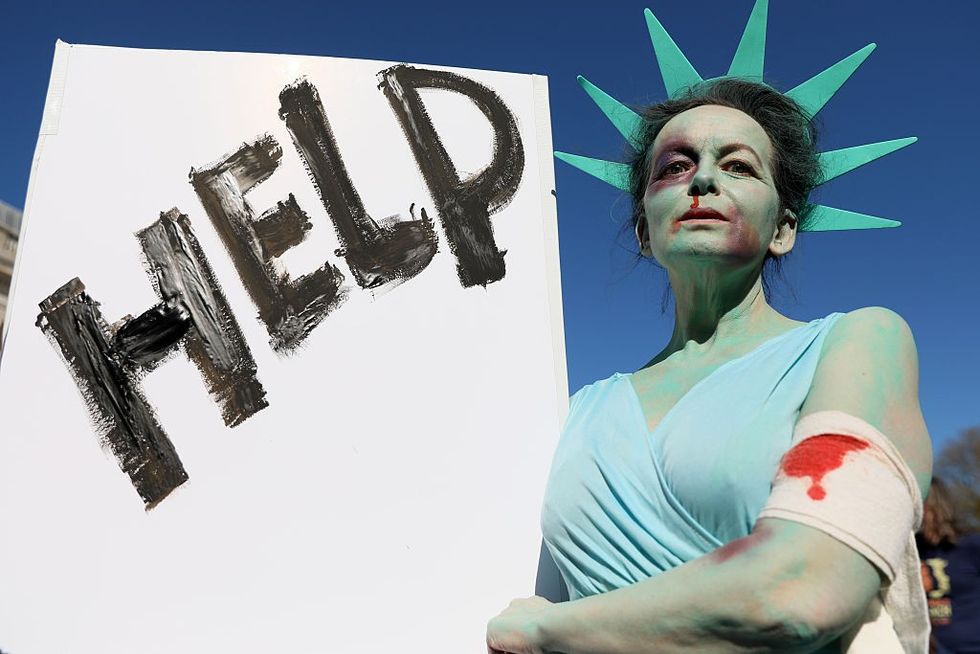
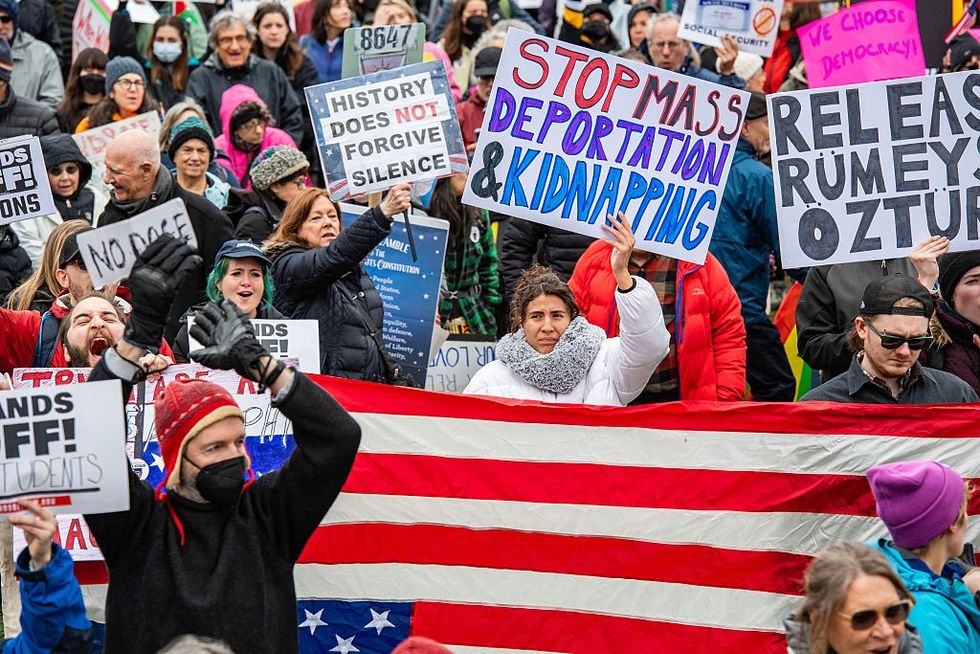



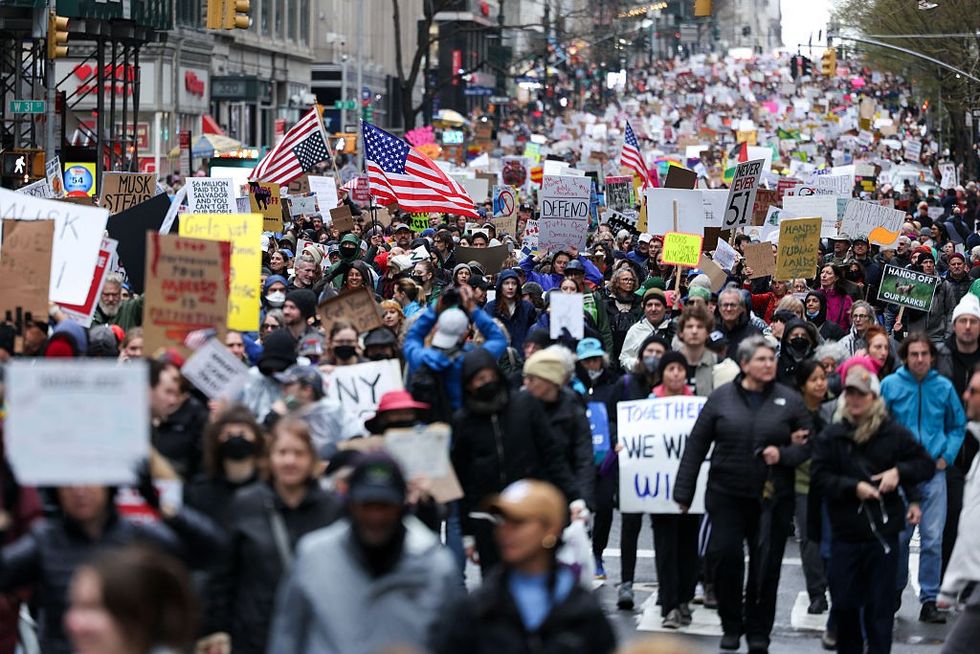

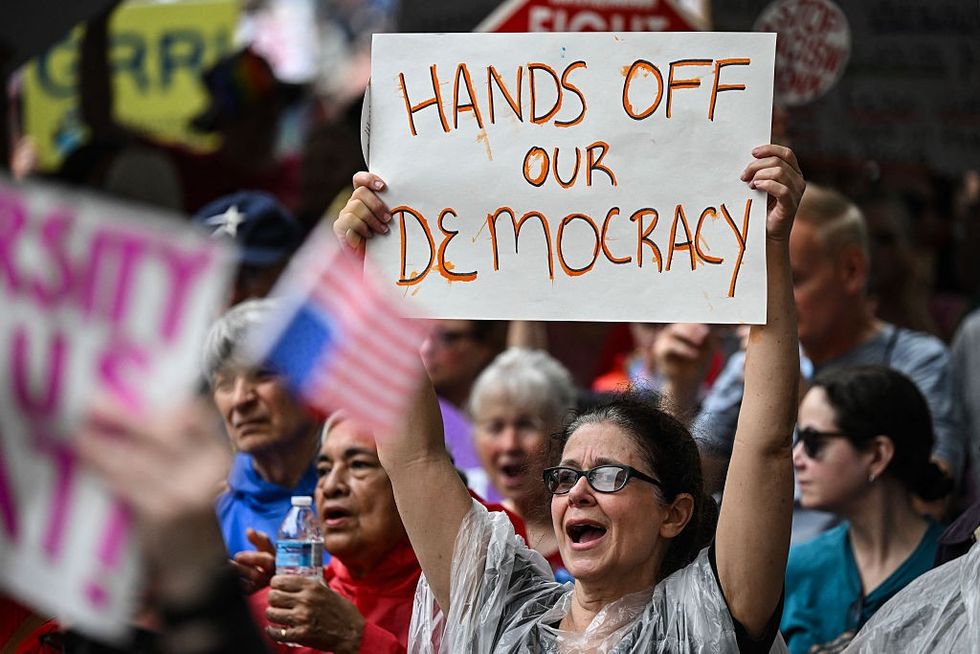



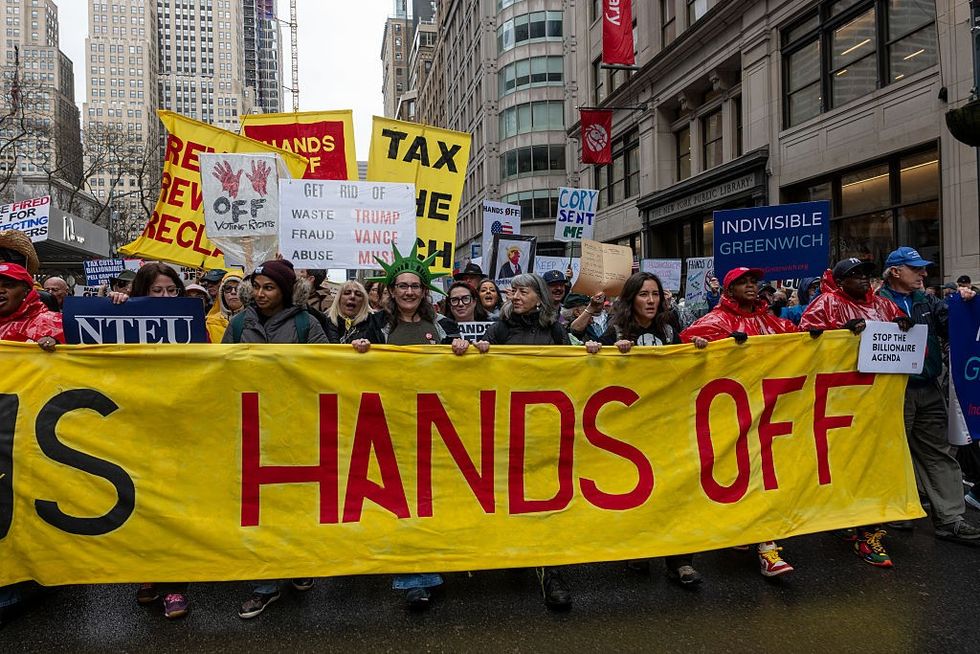



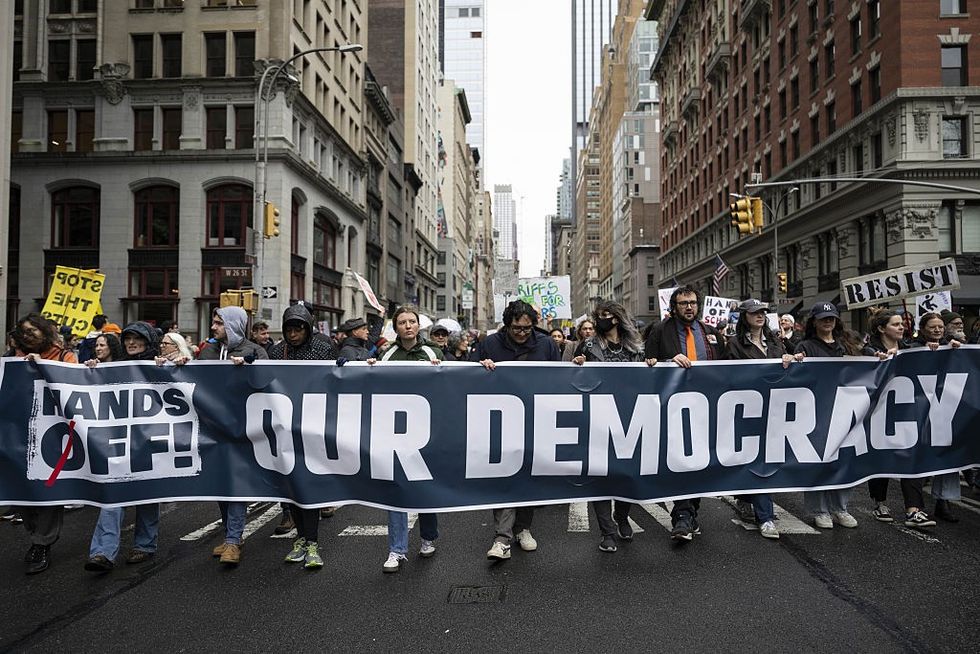

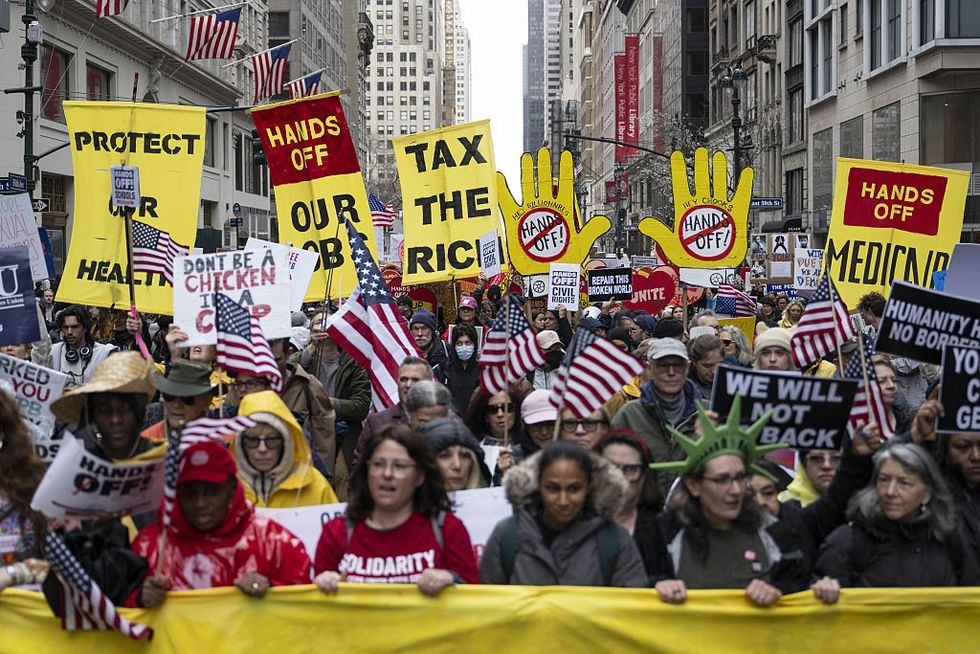
"Everyone involved in this crime against humanity, and everyone who covered it up, would face prosecution in a world that had any shred of dignity left."
A video presented to officials at the United Nations on Friday and first made public Saturday by the New York Times provides more evidence that the recent massacre of Palestinian medics in Gaza did not happen the way Israeli government claimed—the latest in a long line of deception when it comes to violence against civilians that have led to repeated accusations of war crimes.
The video, according to the Palestine Red Crescent Society (PRCS), was found on the phone of a paramedic found in a mass grave with a bullet in his head after being killed, along with seven other medics, by Israeli forces on March 23. The eight medics, buried in the shallow grave with the bodies riddled with bullets, were: Mustafa Khafaja, Ezz El-Din Shaat, Saleh Muammar, Refaat Radwan, Muhammad Bahloul, Ashraf Abu Libda, Muhammad Al-Hila, and Raed Al-Sharif. The video reportedly belonged to Radwan. A ninth medic, identified as Asaad Al-Nasasra, who was at the scene of the massacre, which took place near the southern city of Rafah, is still missing.
The PRCS said it presented the video—which refutes the explanation of the killings offered by Israeli officials—to members of the UN Security Council on Friday.
"They were killed in their uniforms. Driving their clearly marked vehicles. Wearing their gloves. On their way to save lives," Jonathan Whittall, head of the UN's humanitarian affairs office in Palestine, said last week after the bodies were discovered. Some of the victims, according to Gaza officials, were found with handcuffs still on them and appeared to have been shot in the head, execution-style.
The Israeli military initially said its soldiers "did not randomly attack" any ambulances, but rather claimed they fired on "terrorists" who approached them in "suspicious vehicles." Lt. Col. Nadav Shoshani, an IDF spokesperson, said the vehicles that the soldiers opened fire on were driving with their lights off and did not have clearance to be in the area. The video evidence directly contradicts the IDF's version of events.
As the Times reports:
The Times obtained the video from a senior diplomat at the United Nations who asked not to be identified to be able to share sensitive information.
The Times verified the location and timing of the video, which was taken in the southern city of Rafah early on March 23. Filmed from what appears to be the front interior of a moving vehicle, it shows a convoy of ambulances and a fire truck, clearly marked, with headlights and flashing lights turned on, driving south on a road to the north of Rafah in the early morning. The first rays of sun can be seen, and birds are chirping.
In an interview with Drop Site News published Friday, the only known paramedic to survive the attack, Munther Abed, explained that he and his colleagues "were directly and deliberately shot at" by the IDF. "The car is clearly marked with 'Palestinian Red Crescent Society 101.' The car's number was clear and the crews' uniform was clear, so why were we directly shot at? That is the question."
The video's release sparked fresh outrage and demands for accountability on Saturday.
"The IDF denied access to the site for days; they sent in diggers to cover up the massacre and intentionally lied about it," said podcast producer Hamza M. Syed in reaction to the new revelations. "The entire leadership of the Israeli army is implicated in this unconscionable war crime. And they must be prosecuted."
"Everyone involved in this crime against humanity, and everyone who covered it up, would face prosecution in a world that had any shred of dignity left," said journalist Ryan Grim of DropSite News.
"They're dismantling our country. They're looting our government. And they think we'll just watch."
In communities across the United States and also overseas, coordinated "Hands Off" protests are taking place far and wide Saturday in the largest public rebuke yet to President Donald Trump and top henchman Elon Musk's assault on the workings of the federal government and their program of economic sabotage that is sacrificing the needs of working families to authoritarianism and the greed of right-wing oligarchs.
Indivisible, one of the key organizing groups behind the day's protests, said millions participated in more than 1,300 individual rallies as they demanded "an end to Trump's authoritarian power grab" and condemning all those aiding and abetting it.
"We expected hundreds of thousands. But at virtually every single event, the crowds eclipsed our estimates," the group said in a statement Saturday evening.
"Hands off our healthcare, hands off our civil rights, hands off our schools, our freedoms, and our democracy."
"This is the largest day of protest since Trump retook office," the group added. "And in many small towns and cities, activists are reporting the biggest protests their communities have ever seen as everyday people send a clear, unmistakable message to Trump and Musk: Hands off our healthcare, hands off our civil rights, hands off our schools, our freedoms, and our democracy."
According to the organizers' call to action:
They're dismantling our country. They’re looting our government. And they think we'll just watch.
On Saturday, April 5th, we rise up with one demand: Hands Off!
This is a nationwide mobilization to stop the most brazen power grab in modern history. Trump, Musk, and their billionaire cronies are orchestrating an all-out assault on our government, our economy, and our basic rights—enabled by Congress every step of the way. They want to strip America for parts—shuttering Social Security offices, firing essential workers, eliminating consumer protections, and gutting Medicaid—all to bankroll their billionaire tax scam.
They're handing over our tax dollars, our public services, and our democracy to the ultra-rich. If we don't fight now, there won’t be anything left to save.
The more than 1,300 "Hands Off!" demonstrations—organized by a large coalition of unions, progressive advocacy groups, and pro-democracy watchdogs—first kicked off Saturday in Europe, followed by East Coast communities in the U.S., and continued throughout the day at various times, depending on location. See here for a list of scheduled "Hands Off" events.
"The United States has a president, not a king," said the progressive advocacy group People's Action, one of the group's involved in the actions, in an email to supporters Saturday morning just as protest events kicked off in hundreds of cities and communities. "Donald Trump has, by every measure, been working to make himself a king. He has become unanswerable to the courts, Congress, and the American people."
In its Saturday evening statement, Indivisible said the actions far exceeded their expectations and should be seen as a turning point in the battle to stop Trump and his minions:
The Trump administration has spent its first 75 days in office trying to overwhelm us, to make us feel powerless, so that we will fall in line, accept the ransacking of our government, the raiding of our social safety net, and the dismantling of our democracy.
And too often, the response from our leaders and those in positions to resist has been abject cowardice. Compliance. Obeying in advance.
But not today. Today we've demonstrated a different path forward. We've modeled the courage and action that we want to see from our leaders, and showed all those who've been standing on the sidelines who share our values that they are not alone.
Citing the Republican president's thirst for "power and greed," People's Action earlier explained why organized pressure must be built and sustained against the administration, especially at the conclusion of a week in which the global economy was spun into disarray by Trump's tariff announcement, his attack on the rule of law continued, and the twice-elected president admitted he was "not joking" about the possibility of seeking a third term, which is barred by the constitution.
"He is destroying the economy with tariffs in order to pay for the tax cuts he wants to push through to enrich himself and his billionaire buddies," warned People's Action. "He has ordered the government to round up innocent people off of the streets and put them in detention centers without due process because they dared to speak out using their First Amendment rights. And he is not close to being done—by his own admission, he is planning to run for a third term, which the Constitution does not allow."
Live stream of Hands Off rally in Washington, D.C.:
Below are photo or video dispatches from demonstrations around the world on Saturday. Check back for updates...
United Kingdom
France
Germany
Belgium:
Massachusetts:
Maine:
Washington, D.C.:
New York:
Minnesota:
Michigan:
Ohio:
Colorado:
Pennsylvania:
North Carolina:
The protest organizers warn that what Trump and Musk are up to "is not just corruption" and "not just mismanagement," but something far more sinister.
"This is a hostile takeover," they said, but vowed to fight back. "This is the moment where we say NO. No more looting, no more stealing, no more billionaires raiding our government while working people struggle to survive."